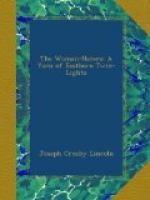“Aw, come off! Woman-hater! You hate women same as the boy at the poorhouse hated ice cream—’cause there ain’t none around. Why, I wouldn’t trust you as fur as I could see you!”
This was the end of the dialogue, because Mr. Payne was obliged to break off his harangue and dodge the stove-lifter flung at him by the outraged lightkeeper. As the lifter was about to be followed by the teakettle, Ezra took to his heels, bolted from the house and began his long tramp to the village. When he reached the first clumps of bayberry bushes bordering the deeply rutted road, a joyful cloud of mosquitoes rose and settled about him like a fog.
So Seth Atkins was left alone to do double duty at Eastboro Twin-Lights, pending the appointment of another assistant. The two days and nights following Ezra’s departure had been strenuous and provoking. Doing all the housework, preparation of meals included, tending both lights, rubbing brass work, sweeping and scouring, sleeping when he could and keeping awake when he must, nobody to talk to, nobody to help—the forty-eight hours of solitude had already convinced Mr. Atkins that the sooner a helper was provided the better. At times he even wished the disrespectful Payne back again, wished that he had soothed instead of irritated the departed one. Then he remembered certain fragments of their last conversation and wished the stove-lifter had been flung with better aim.
Now, standing on the gallery of the south tower, he was conscious of a desire for breakfast. Preparing that meal had been a part of his assistant’s duties. Now he must prepare it himself, and he was hungry and sleepy. He mentally vowed that he would no longer delay notifying the authorities of the desertion, and would urge them to hurry in sending some one to fill the vacant place.
Grumbling aloud to himself, he moved around the circle of the gallery toward the door. His hand was on the latch, when, turning, he cast another glance over the rail, this time directly downward toward the beach below. And there he saw something which caused him to forget hunger and grievances of all kinds; something which, after one horrified look to make sure, led him to dart into the light chamber, spring at a reckless gait down the winding stair, out of the tower, rush to the edge of the bluff, and plunge headlong down the zigzag path worn in the clay.
On the sand, at the foot of the bluff below the lights, just beyond reach of the wash of the surf, lay a man, or the dead body of a man, stretched at full length.
CHAPTER II
MR. JOHN BROWN




